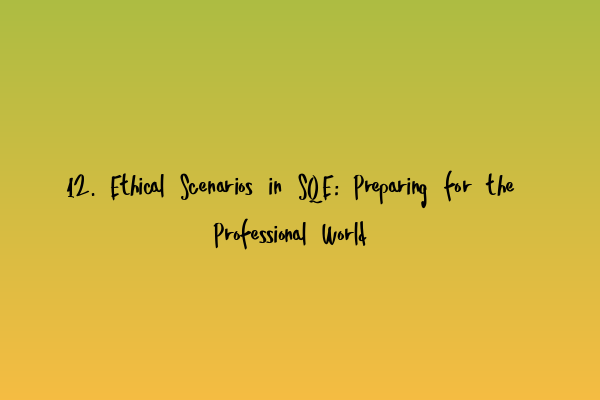Ethical Scenarios in SQE: Preparing for the Professional World
As aspiring solicitors, it is crucial to understand and navigate ethical scenarios in the legal profession. The Solicitors Qualifying Exam (SQE) tests not only your legal knowledge but also your ability to apply ethical principles in real-life scenarios. In this article, we will explore 12 ethical scenarios that you may encounter in the SQE and provide insights on how to approach and resolve them.
1. Conflict of Interest
One common ethical scenario involves a conflict of interest. This occurs when a solicitor’s duty to one client clashes with their duty to another client or a third party. Understanding the conflict and its implications is essential. To learn more about conflict of interest and how to handle it, check out this article on conflict resolution.
2. Client Confidentiality
Client confidentiality is a cornerstone of the legal profession. You must know how to maintain and protect client information while adhering to professional obligations. Our guide on SQE1 multiple-choice questions provides insights into client confidentiality scenarios.
3. Professional Boundaries
It is crucial to establish clear professional boundaries with clients to maintain professionalism and avoid conflicts. Scenarios may test your ability to handle situations where clients cross established boundaries. Our article on effective revision techniques can offer guidance on understanding and addressing professional boundary scenarios.
4. Lawyer’s Duty to the Court
A solicitor has a duty to the court that must be upheld to ensure the administration of justice. Scenarios may require you to balance your duty to your client and your duty to the court. Developing problem-solving skills can help you navigate these ethical dilemmas. Learn more about problem-solving skills in our article on scenario-based questions in SQE2.
5. Handling Unethical Instructions
At times, you may encounter clients who provide instructions that may be unethical or against your professional obligations. Knowing how to handle such situations is crucial to maintaining your integrity. Our article on understanding SQE feedback can help extract valuable insights into addressing unethical instructions.
6. Dealing with Difficult Clients
Interacting with difficult clients can be challenging, but it is essential to handle them professionally and ethically. Developing effective communication and empathy skills is vital in such scenarios. Refer to our article on mastering effective revision techniques to enhance your communication skills.
7. Informed Consent
Informed consent is a critical aspect of legal representation. Understanding when and how to obtain informed consent from clients is essential for ethical practice. Familiarize yourself with the concept of informed consent through our guide on effective revision techniques.
8. Advertising and Marketing
Advertising and marketing are essential aspects of building a thriving legal practice. However, it is vital to advertise and market yourself ethically without misleading or misrepresenting information. Understanding the ethical boundaries in advertising and marketing is crucial to your future legal career.
9. Pro Bono Work
Pro bono work is integral to the legal profession, providing access to justice for individuals who may not be able to afford legal services. Knowing how to balance your pro bono work with your other professional obligations is important for ethical practice.
10. Handling Client Trust Funds
Properly managing client trust funds is a key responsibility for solicitors. Understanding the rules and regulations surrounding client money and ensuring accurate bookkeeping is crucial to avoid ethical breaches in this area.
11. Impartiality and Fairness
As a solicitor, it is essential to uphold impartiality and fairness in your professional practice. Understanding how to maintain these principles in various scenarios will serve as a strong foundation for ethical decision-making.
12. Whistleblowing
Whistleblowing is a complex ethical scenario that may arise in your legal career. Knowing when and how to report unethical behavior within your organization is essential to protect the interests of your clients and the profession as a whole.
In conclusion, developing ethical competence is crucial to succeed in the SQE and thrive in the legal profession. By familiarizing yourself with various ethical scenarios and their potential resolutions, you will be better prepared to navigate the challenges that may arise. Remember to always prioritize professionalism, integrity, and adherence to ethical principles.
For more resources on SQE preparation, check out the following related articles:
- Mastering Time Management in SQE: Strategies for Efficient Exam Completion
- Conquer the Multiple Choice Questions (MCQ) in SQE1
- Mastering Effective Revision Techniques for SQE Success
- Scenario-Based Questions SQE2: Enhance Your Problem-Solving Skills
- Understanding SQE Feedback: Extracting Valuable Insights
